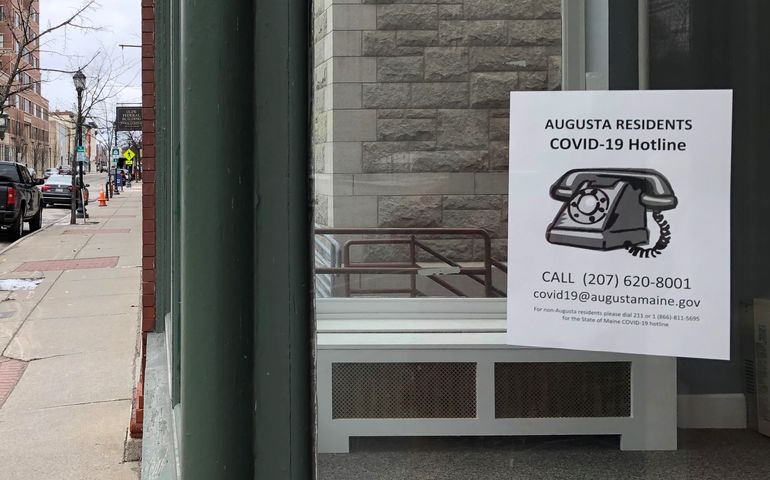Maine business relief grants launch; federal help sought for state, local governments
 Photo / Maureen Milliken
More federal help is needed for Maine municipalities, struggling with revenue shortfalls from the COVID-19 pandemic, to continue to provide services for residents, Augusta City Manager Bill Bridgeo said in a media call Monday with Gov. Janet Mills, U.S. Sen. Angus King, I-Maine, and members of the union that represents state and municipal employees.
Photo / Maureen Milliken
More federal help is needed for Maine municipalities, struggling with revenue shortfalls from the COVID-19 pandemic, to continue to provide services for residents, Augusta City Manager Bill Bridgeo said in a media call Monday with Gov. Janet Mills, U.S. Sen. Angus King, I-Maine, and members of the union that represents state and municipal employees.
More Information
The state will launch a second phase of the Maine Economic Recovery Grant Program for small businesses and nonprofits Wednesday, but Gov. Janet Mills and other officials stressed that more federal help is needed if Maine is to recover from the COVID-19 pandemic.
The second phase of the grant program makes $95 million available to businesses and nonprofits, expanding eligibility from those with 50 workers or fewer allowed in the first round, to those with up to 250. The new phase also adds businesses that started in the last year, which weren't eligible in the first round.
The launch was announced Monday afternoon, a few hours after Mills joined Augusta City Manager Bill Bridgeo and U.S. Sen. Angus King, I-Maine, in a media conference call to discuss the need for more federal aid in addition to the $157 million Maine got in March. Help is specifically needed for state and municipal governments, and those on the call urged that the U.S. Senate pass the $3 trillion COVID-19 relief bill the House approved in June.
The call focused on the costs of increased need for government services spurred by the pandemic, while municipal and state tax revenues drop and governments make cuts. It was hosted by the American Federation of State County and Municipal Employees, which represents 2,700 Maine state and local government workers.
Some $9 million of the CARES Act money from March went to grants for city, town and tribal governments, but it didn't scratch the surface officials said. The government budget shortfalls have a domino effect that includes layoffs — as seen in many cities including Augusta and, Monday night, in Portland — as well as reduced aid for people in need and tax hikes.
“I’m here today to call upon Congress and every senator to do their jobs, so we can do ours," Mills said.
King said that the fact the Senate and the Trump administration haven't agreed on relief bill "is a failure, there's no excuse for it."
"When we have a hurricane or natural disaster, it never occurs to me to ask whether the state that needs the help is a red state or blue state,” said King. “What we’re facing now is a slow-motion fiscal hurricane wiping out budgets across the country, in red state and blue states. The administration seems to be pretending this is over. But it’s not over."
Lee Saunders, president of AFSCME, said, "If you had told me in May that we still wouldn’t have another COVID-19 relief bill by September, I wouldn’t have believed it." He called on U.S. Sen. Susan Collins, R-Maine, "and her colleagues in the Senate" to pass a relief bill "with robust, direct aid to states, cities, towns and schools."
Lack of support will mean catastrophic job loss in both the public and private sectors, Saunders said. He said the effects will be severely felt among nurses, EMS workers, sanitation workers, child care providers, home care workers, public safety workers and more "who have exposed themselves and their families to risk over the last six months ... thanked for their bravery with pinks slips."
A $650 million Senate bill failed to get the 60 votes needed to pass, with a 52-47 vote. Collins, who voted in favor, said in a Sept. 10 statement that it is a start on a bipartisan compromise, but she stressed it had "notable omissions," including direct assistance to municipalities and public schools.
She is a cosponsor of the SMART Act, which she said would help towns and cities avoid deep cuts to essential services and layoffs of paramedics, firefighters, police, sanitation workers, public health and public works employees. She is opposed for the Senate seat by Democrat Sarah Gideon.
Augusta, Portland layoffs
Bridgeo said lack of more help for municipalities will have a domino effect throughout communities and the state.
“If we don’t see some relief, and if the state has to reduce what they typically send to us, I would say it’s more pain for the local government and the local residents going forward,” he said.
Augusta has laid off 32 of its 240 employees, a process Bridgeo called "excrucating and painful."
In Portland Monday night, the City Council agreed to a budget that eliminates 65 jobs. While some are not currently filled, it amounts to laying off close to 40 people, city officials said.
Another issue in Augusta is the Augusta Civic Center, which is operated by the city. Lack of events at the 6,000-seat arena and conference center, which hosts everything from high school basketball tournaments to major conventions, means no revenue has come in. Bridgeo estimates that the city will be responsible for about $1.5 million that would have been generated by the civic center.
Mills said that one issue with the federal money awarded to the state in the March CARES Act is that is has to be spent by the end of this calendar year, and the state's fiscal year doesn't end until July, making it difficult to use it to reconcile the state's projected $528 million shortfall. Mills has asked state departments to reduce costs by 10% to close the gap.
She said that the Dec. 31 spending deadline, as well as the fact the money provided the state so far hasn't been enough, is hurting recovery efforts.
Second phase will go to more businesses
The state Department of Economic and Community Development estimates that nearly 3,000 more businesses and nonprofits will be eligible for grants in the round that opens Wednesday. Businesses and nonprofits that employ up to 250 will be eligible — the previous round was for those that employ up to 50 people. Licensed child care and behavioral health organizations will also be eligible in this round.
Up to $5 million of the $95 million will be dedicated to support the viability of businesses less than a year old, which were also not previously eligible. The Maine Technology Institute, which offers grants, loans, equity investments and services to support Maine’s innovation economy, will lead the application review and financial disbursement of awards in its sectors.
The Maine Economic Recovery Grant Program is intended to help sustain the viability of Maine’s small businesses and nonprofits — not to replace lost profits — by providing short-term financial relief for businesses and non-profit organizations that incurred business disruptions as a result of the COVID-19 pandemic, a news release from Mills' office said.
Grant applications will be accepted through Oct. 23, with awards announced in November.
For 'as many businesses as possible'
Mills said while the first phase focused on small businesses and nonprofits that may have fallen through the cracks of other relief programs, the remaining grant awards will "make sure that as many eligible businesses as possible can have some financial relief."
“While these grants cannot wholly replace or repair the economic damage this pandemic has caused, we hope that they will help sustain businesses through this difficult time," she said. "As always, I continue to urge Congress to step up to provide greater relief to the people and state of Maine.”
It's expected that $105 million in awards, averaging approximately $45,000, will be made through early next month in the first phase, DECD said. Eligibility and financial verification steps are being completed now.
Approximately 2,100 businesses and organizations submitted eligible applications in the first phase. Of those, 89% were businesses and 11% nonprofits. Of the small business applications, about 30-35% were from the hospitality sector, which includes lodging establishments and restaurants, with the rest representing a broad cross section of economic sectors, DECD said.
Grants may be used to cover expenses, including payroll costs and expenses, rent or mortgage payments for business property, utilities, necessary operating expenses, expenses incurred to replenish inventory or other necessary re-opening expenses, purchase of personal protective equipment required by the business or business-related equipment. Money must be spent on operations that are strictly within Maine. Recipients are liable for any misuse of the grant money, and the grants are subject to audit.














0 Comments